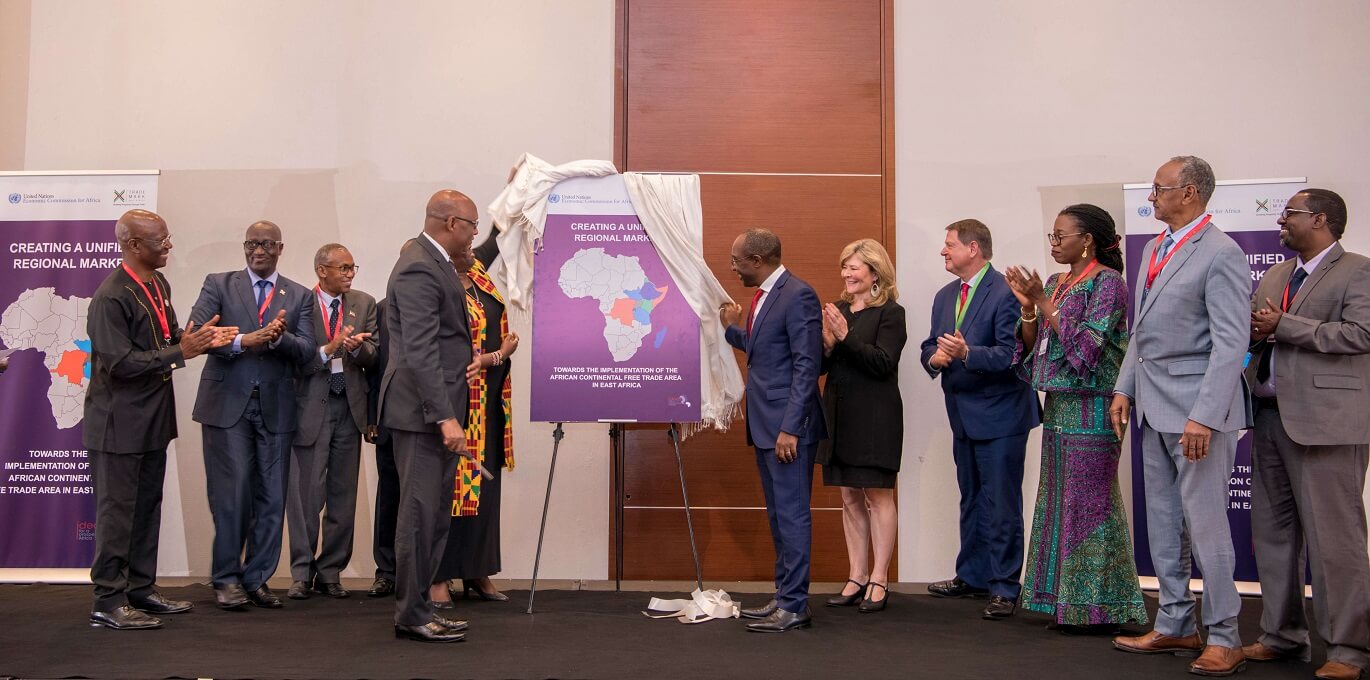Nairobi, 5 th March 2020: East Africa is anticipated to earn US$ 1.8 billion in welfare gains and benefit from 2 million jobs from the successful implementation of Africa Free Continental Trade Area (AfCFTA), which becomes operational this July. This is according to a ground-breaking report coproduced by the United Nations Economic Commission for Africa (UNECA) and TradeMark Africa (TMA) titled ‘Creating a Unified Regional Market- Towards the Implementation of the African Continental Free Trade Area in East Africa.’
The Chief Guest at the launch was Kenya’s East African Community and Regional Development Cabinet Secretary (CS) Adan Mohamed flanked by Trade Ministers from other East African countries. CS Mohamed noted that the new Continental Trade Block will present unprecedented opportunities for the region. “With the advanced integration of EAC, we’ve witnessed first-hand the benefits of trading more with each other. The AfCFTA will not only enable us to enhance this trade in the region, it will also allow our business community to access a much wider market of other African countries,” explained Mohammed.
The journey towards this ambitious Continental Free Trade Area gained momentum in March 2018, when 44 nations signed up during the African Union Extra-Ordinary Session in Kigali, Rwanda. Currently 54 out of the 55 African Union Member States have signed the AfCFTA. AfCFTA creates the single largest trade block in the world.
Speaking during the launch of the report TMA Chief Executive Officer Frank Matsaert noted the new trade deal holds great promise for East Africa and the African continent as a whole, “The working age demographic of East Africa is expected to rise at 8.6 million annually in the next 15 years. We must work together to create economic opportunities for this group. Through our trade facilitation work across East Africa, we have seen how eliminating barriers to trade, boosts regional businesses and grows returns for investors, employment for citizens and revenue for governments,” noted Frank.
Matsaert further said that TMA will offer technical support in AfCFTA implementation in the region in among other areas; harmonising standards, enhancing capacity of trade systems, eliminating NonTariff Barriers (NTBs), promoting inclusive trade and supporting private sector to lobby for friendly policies. “Over the last 10 years, our trade facilitation work has delivered great results in reducing time it takes to cross select One Stop Border Posts (OSBPs) by an average of 70%, reducing the time it takes to transport a container from Mombasa Port to Kampala by 16%, promoting inclusive trade through Women in Trade Program that has already impacted approximately 30,000 women and now targeting to reach 150, 000 women in the EAC countries and DRC by 2023.”
The AfCFTA has been ratified by 29 countries against a thresh-hold of 22 countries as stipulated by Article 23 of the Agreement, paving the way for its operationalization. In East Africa, the trade deal 2 has already been ratified by Kenya, Rwanda, Uganda and Ethiopia. Once fully operational, AfCFTA will create a US$2.5 trillion and 1.3 billion people market.
United Nations Economic Commission for Africa (UNECA) Director Regional Integration and Trade, Dr. Stephen Karingi observed that if well implemented, AfCFTA will unleash the trade potential of the region. “By lowering tariffs on both immediate and final goods, CFTA will create exciting opportunities for diversification and adding value to our natural resources. The deal will also scale up regional manufacturing which has stagnated around 10% of the GDP, which compares badly with fast developing economies such as China, India, Vietnam and Singapore” noted Karingi.
Among sectors expected to benefit greatly is manufacturing, as regional firms increase their capacity to satisfy the larger market. The report observes that manufacturers in the region are operating at between 20-40% below their true potential. A 2019 study by the Africa Report for instance ranking top firms in the continent by turnover, registered only 34 from East Africa in the top 500 firms in Africa.
The report estimates that with East African firms exporting more, the region will earn an extra US$ 1.1 billion on the strength of higher exports of processed food, textiles, clothing and light manufacturing. Small and Medium Sized Enterprises (SMEs) which account for 80% of the regions businesses but which struggle to penetrate foreign markets are also expected to get a major boost by the new trade deal as regional value chains emerge.
With East Africa bearing the brunt of adverse climatic change and the resultant unpredictable weather patterns, coupled with existence of fragile and conflict affected zones, factors which exacerbate food insecurity in the region, AfCFTA will boost regional food security. With more open borders, greater flexibility in shifting food supplies from surplus regions to regions facing deficits is expected.
The AfCFTA is also expected to help tackle gender inequality in East Africa, as most of the new jobs will be created in female labour dominated sectors such as agriculture, textile and cross broader MSMEs.
Key challenges will need to be addressed for East Africans to enjoy the benefits of this agreement. These include developing and maintaining world class infrastructure to ensure efficient movement of goods and services both hard (roads, airports, ports, border points) and soft (trade processes, documentation) as well as harmonising trade policies and enhancing business environment for better trade.
There is now an urgent need to convert the strong political will driving the AfCFTA agenda into the delivery of concrete results.
For additional Information and requests for interviews, please contact:
Mr. Kaara Wainaina
TMA Communications Manager
kaara.wainaina@trademarkea.com
+254 0782 703 458
Mr. Didier Habimana, UNECA
Communication Officer
habimanad@un.org
+250 788493377














